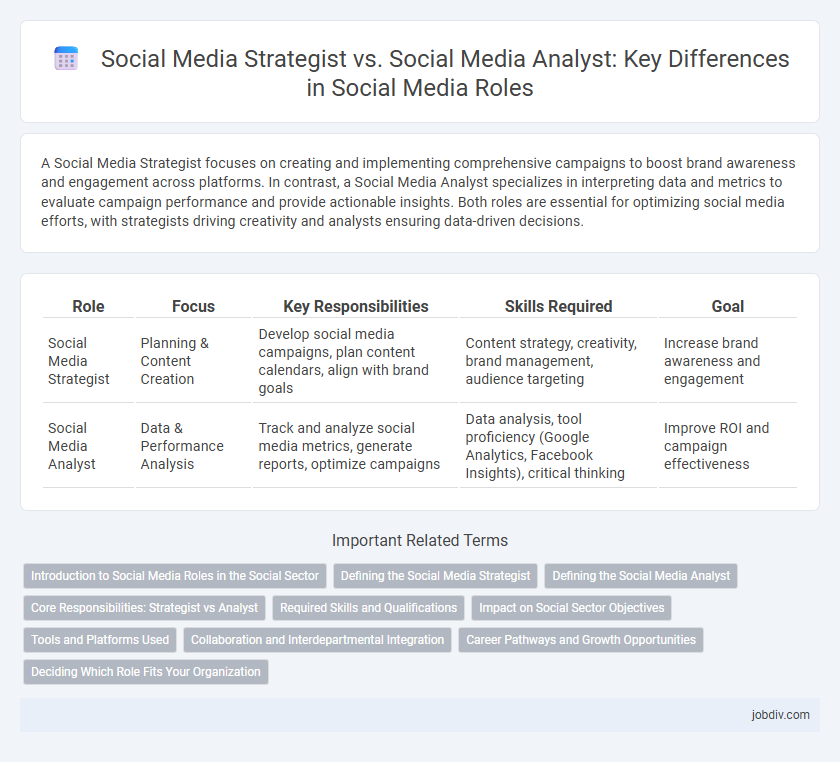A Social Media Strategist focuses on creating and implementing comprehensive campaigns to boost brand awareness and engagement across platforms. In contrast, a Social Media Analyst specializes in interpreting data and metrics to evaluate campaign performance and provide actionable insights. Both roles are essential for optimizing social media efforts, with strategists driving creativity and analysts ensuring data-driven decisions.
Table of Comparison
| Role | Focus | Key Responsibilities | Skills Required | Goal |
|---|---|---|---|---|
| Social Media Strategist | Planning & Content Creation | Develop social media campaigns, plan content calendars, align with brand goals | Content strategy, creativity, brand management, audience targeting | Increase brand awareness and engagement |
| Social Media Analyst | Data & Performance Analysis | Track and analyze social media metrics, generate reports, optimize campaigns | Data analysis, tool proficiency (Google Analytics, Facebook Insights), critical thinking | Improve ROI and campaign effectiveness |
Introduction to Social Media Roles in the Social Sector
A Social Media Strategist in the social sector crafts targeted campaigns to enhance brand awareness and community engagement, aligning content with organizational goals and audience insights. In contrast, a Social Media Analyst focuses on measuring campaign performance through data analytics, tracking key metrics like engagement rates, follower growth, and content reach to inform strategic decisions. Both roles collaborate to optimize social media impact, driving social change and amplifying advocacy efforts.
Defining the Social Media Strategist
A Social Media Strategist develops comprehensive plans to enhance brand presence across platforms, leveraging audience insights and market trends to drive engagement and growth. They create content calendars, set campaign objectives, and coordinate with creative teams to align social media efforts with overall business goals. This role requires deep knowledge of platform algorithms, user behavior, and competitive analysis to craft impactful strategies that maximize ROI.
Defining the Social Media Analyst
A Social Media Analyst specializes in interpreting data from social media platforms to measure the effectiveness of campaigns and audience engagement. They use analytics tools such as Google Analytics, Facebook Insights, and Twitter Analytics to track key performance indicators (KPIs) like reach, impressions, and conversion rates. Their insights directly inform strategic decisions to optimize content performance and improve overall social media ROI.
Core Responsibilities: Strategist vs Analyst
A Social Media Strategist focuses on developing comprehensive content plans, setting campaign goals, and identifying target audiences to enhance brand engagement and growth. In contrast, a Social Media Analyst is responsible for monitoring data metrics, analyzing audience behavior, and measuring campaign performance to inform strategic decisions. While strategists design the roadmap for social media success, analysts provide critical insights through data interpretation to optimize ongoing efforts.
Required Skills and Qualifications
A Social Media Strategist requires strong skills in content creation, brand storytelling, and campaign planning to develop and execute comprehensive social media plans aligned with business goals. In contrast, a Social Media Analyst prioritizes expertise in data analysis, social media metrics interpretation, and proficiency with analytics tools like Google Analytics and Hootsuite to monitor performance and inform strategy adjustments. Both roles demand excellent communication skills and a deep understanding of various social media platforms.
Impact on Social Sector Objectives
A Social Media Strategist crafts targeted campaigns that align with social sector objectives, amplifying outreach and engagement to drive community impact and advocacy. In contrast, a Social Media Analyst evaluates performance metrics and audience behaviors to provide data-driven insights that optimize strategy effectiveness and resource allocation. Both roles collaboratively enhance social initiatives by combining creative direction with analytical rigor to maximize mission-driven results.
Tools and Platforms Used
Social Media Strategists utilize tools like Hootsuite, Buffer, and Sprout Social to schedule content, manage campaigns, and monitor engagement across platforms such as Facebook, Instagram, LinkedIn, and Twitter. Social Media Analysts rely heavily on analytics platforms like Google Analytics, Socialbakers, and Brandwatch to track performance metrics, audience insights, and sentiment analysis. Both roles leverage data visualization tools like Tableau or Power BI to interpret social media trends and optimize content strategies.
Collaboration and Interdepartmental Integration
Social Media Strategists and Social Media Analysts collaborate closely to align data-driven insights with creative campaign execution, enhancing overall marketing effectiveness. Strategists focus on crafting engaging content and audience targeting, while Analysts provide performance metrics and trend analysis that inform strategic adjustments. This interdepartmental integration fosters adaptive social media initiatives that drive brand growth and customer engagement.
Career Pathways and Growth Opportunities
Social Media Strategists typically focus on crafting and implementing comprehensive campaigns that drive brand awareness and engagement, positioning themselves for leadership roles in marketing and content direction. Social Media Analysts specialize in data interpretation and performance metrics, providing actionable insights that inform strategic decisions and often progressing into advanced analytics or digital marketing strategy positions. Both career pathways offer robust growth opportunities, with increasing demand for data-driven and creative skills in digital marketing landscapes.
Deciding Which Role Fits Your Organization
A Social Media Strategist crafts comprehensive campaigns to align with organizational goals, focusing on creative content and audience engagement, while a Social Media Analyst interprets data to measure performance and optimize strategies based on metrics like ROI and engagement rates. Companies seeking innovation and brand growth benefit from a strategist's expertise, whereas data-driven organizations prioritize analysts to refine targeting and improve campaign effectiveness. Evaluating your organization's priority--whether creative leadership or analytical precision--helps determine the ideal role to hire for social media success.
Social Media Strategist vs Social Media Analyst Infographic

 jobdiv.com
jobdiv.com